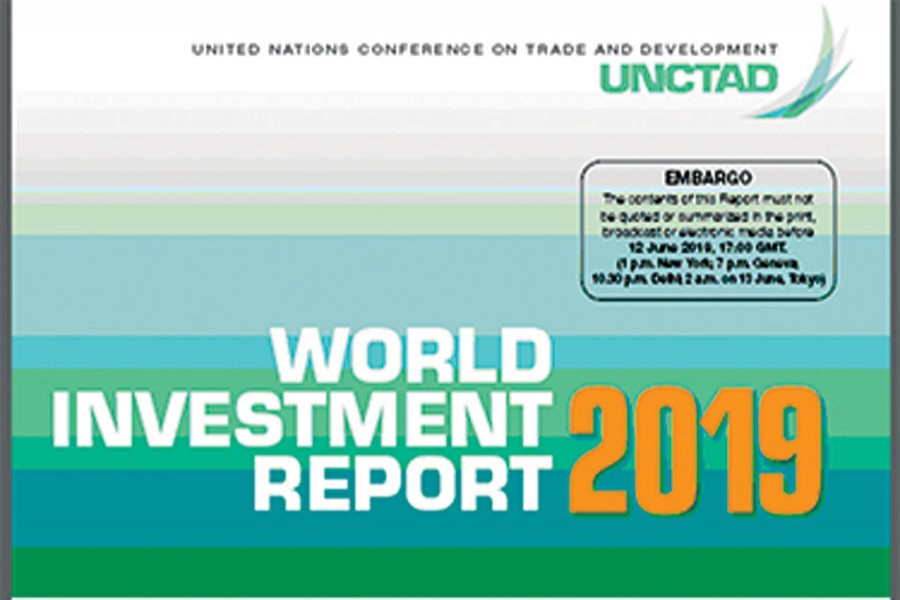
Published :
Updated :

The current development of special economic zones (SEZs) through public-private partnership in Bangladesh and other Asian countries is likely to help attract more foreign direct investment (FDI).
The United Nations Conference on Trade and Development (UNCTAD) predicted this in its World Investment Report (WIR)-2019. The report was released Wednesday night.
As a flagship publication of the UN body, it generally provides the global FDI and also focused a theme linked with FDI. This year it focused on SEZs.
Global FDI flows slid by 13 per cent in 2018, to US$1.3 trillion from $1.5 trillion the previous year - the third consecutive annual decline, said the latest report.
The UNCTAD noted special zones are one of the most important tools to attract foreign investment in different countries and said the number of SEZs around the world has increased at a faster rate in the current decade.
The global tally of zones has increased to nearly 5,400, up from 4,000 five years ago, and more than 500 new SEZs are in the pipeline.
Presenting a brief review of SEZs in Bangladesh, the report said of 39 SEZs in the country, some are in operation while other units are under construction.
Bangladesh's eight public and one private EPZ (Export Process Zone) are all specialised SEZs focusing on apparel and textiles.
The Korean Export Processing Zone, a private cluster, was developed and is managed by a subsidiary of Youngone Corporation (Republic of Korea), according to the report.
"In addition to the nine EPZs, the country hosts another 30 economic zones, 24 of which are under development," the report said, adding four of these are being developed through international partnerships, it added.
The UNCTAD report pointed out the number of SEZs in South Asia is set to increase substantially in the coming years.
"India has over 200 new zones in the pipeline, although growth may lose momentum now that permits for a substantial number of zones have been retracted," it mentioned.
In Bangladesh, a further 60 SEZs are in the approval process. Pakistan is planning another 39 SEZs, in addition to its existing seven.
Nepal, which has two zones, one of which is under construction, has plans to create 12 more.
The report mentioned that Bangladesh Economic Zones Authority (BEZA)'s mission is to establish 100 economic zones across the country between 2015 and 2030 with two goals.
One goal is to create 10 million jobs while the cumulative employment of half a million was created by the country's eight existing EPZs over three decades, according to the report.
Another goal is to earn additional $40 billion in exports, which are almost equivalent to the country's total exports in 2017.
The programme's FDI target of $9.6 billion is also "ambitious", given the country's annual average FDI flows of $2.2 billion in 2015-2017, 15 to 20 per cent of which was attracted by the eight EPZs, noted the report.
The objectives include fostering linkages between the economic zones and local industries and narrowing regional economic disparities.
FDI scenario
The report said the net inflow of FDI in Bangladesh stood at US$ $3.61 billion in 2018 registering around 68 per cent growth over 2017.
The Bangladesh Investment Development Authority (BIDA) expects to register $3.7 billion of FDI in 2019, supported by policy reforms, it added.
Bangladesh became the top host LDC to attract FDI in the past year followed by Myanmar ($3.58 billion), Ethiopia ($3.30 billion), Cambodia ($3.10 billion) and Mozambique ($2.70 billion).
FDI flows to the LDCs rebounded to $24 billion (up 15 per cent from 2017), representing 1.8 per cent of global FDI inflows, said the UNCTAD report. "FDI in Ethiopia and Myanmar slowed and the major gains came in Bangladesh," it said.
The WIR pointed out that the value of cross-border Merger and Acquisition (M&A) sales in the LDCs was boosted by a single deal in Bangladesh.
"In Bangladesh, the gains were mostly the result of a $1.5 billion M&A deal in tobacco and new investments in power generation," the report said, adding Japan Tobacco acquired United Dhaka Tobacco for $1.5 billion, which was the second major acquisition in three years concluded by this Japanese multinational in an LDC.
"Also, reinvested earnings in the country, mainly by MNEs in banking, textiles and wearing apparel, more than trebled to $1.3 billion," it added.
Of the top 10 announced greenfiled investment projects in the LDCs in past year, two were in Bangladesh.
The country attracted a $3.0 billion project for the construction of oil and liquefied natural gas terminals, announced jointly by General Electric (United States), Mitsubishi (Japan) and Summit (Singapore).
Another one is $984 million project of fossil fuel electric power proposed by China Huadian Corporation.
asjadulk@gmail.com


 For all latest news, follow The Financial Express Google News channel.
For all latest news, follow The Financial Express Google News channel.